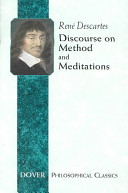Descartes Rules
I thought the following four [rules] would be enough, provided that I made a firm and constant resolution not to fail even once in the observance of them.
The first was never to accept anything as true if I had not evident knowledge of its being so; that is, carefully to avoid precipitancy and prejudice, and to embrace in my judgment only what presented itself to my mind SO cleariy and distinctly that I had no occasion to doubt it. The second, to divide each problem I examined into as many parts as was feasible, and as was requisite for its better solution. The third, to direct my thoughts in an orderly way; beginning with the simplest objects, those most apt to be known, and ascending little by little, in steps as it were, to the knowledge of the most complex; and establishing an order in thought even when the objects had no natural priority one to another. And the last, to make throughout such complete enumerations and such general surveys that I might be sure of leaving nothing out.
These long chains of perfectly simple and easy reasonings by means of which geometers are accustomed to carry out their most difficult demonstrations had led me to fancy that everything that can fall under human knowledge forms a similar sequence; and that so long as we avoid accepting as true what is not so, and always preserve the right order of deduction of one thing from another, there can be nothing too remote to be reached in the end, or too well hidden to be discovered.
Notes:
The basis for empiricism, even if he abandons them in his own arguments.
Folksonomies: history philosophy empiricism
Taxonomies:
/technology and computing/computer security/network security (0.577444)
/science/social science/philosophy (0.493577)
/society/racism (0.228081)
Keywords:
human knowledge forms (0.929669 (neutral:0.000000)), Descartes Rules (0.809221 (neutral:0.000000)), constant resolution (0.778940 (negative:-0.327731)), easy reasonings (0.771737 (neutral:0.000000)), complete enumerations (0.764032 (negative:-0.380490)), orderly way (0.762173 (positive:0.364469)), simplest objects (0.738062 (positive:0.375699)), better solution (0.735854 (positive:0.653447)), natural priority (0.735327 (neutral:0.000000)), difficult demonstrations (0.733492 (neutral:0.000000)), similar sequence (0.722452 (neutral:0.000000)), general surveys (0.715277 (negative:-0.380490)), long chains (0.710048 (neutral:0.000000)), right order (0.692932 (neutral:0.000000)), empiricism (0.439406 (neutral:0.000000)), geometers (0.427926 (neutral:0.000000)), requisite (0.427714 (positive:0.653447)), prejudice (0.407594 (negative:-0.529569)), observance (0.406645 (negative:-0.327731)), arguments (0.405587 (negative:-0.343040)), deduction (0.404273 (neutral:0.000000)), judgment (0.403562 (negative:-0.501293)), occasion (0.396664 (negative:-0.501293)), basis (0.393360 (neutral:0.000000)), firm (0.387045 (negative:-0.327731)), thing (0.384687 (neutral:0.000000)), precipitancy (0.384547 (negative:-0.529569)), mind (0.384065 (negative:-0.501293)), steps (0.382707 (neutral:0.000000)), problem (0.382235 (neutral:0.000000))
Concepts:
Cognition (0.982511): dbpedia | freebase | opencyc
Epistemology (0.912844): dbpedia | freebase | opencyc
Mind (0.850937): dbpedia | freebase | opencyc
Knowledge (0.766023): dbpedia | freebase
Accept (0.749440): website | dbpedia | freebase | yago | musicBrainz
Scientific method (0.737902): dbpedia | freebase
Plato (0.723099): dbpedia | freebase | opencyc | yago
Reasoning (0.696994): dbpedia | opencyc





